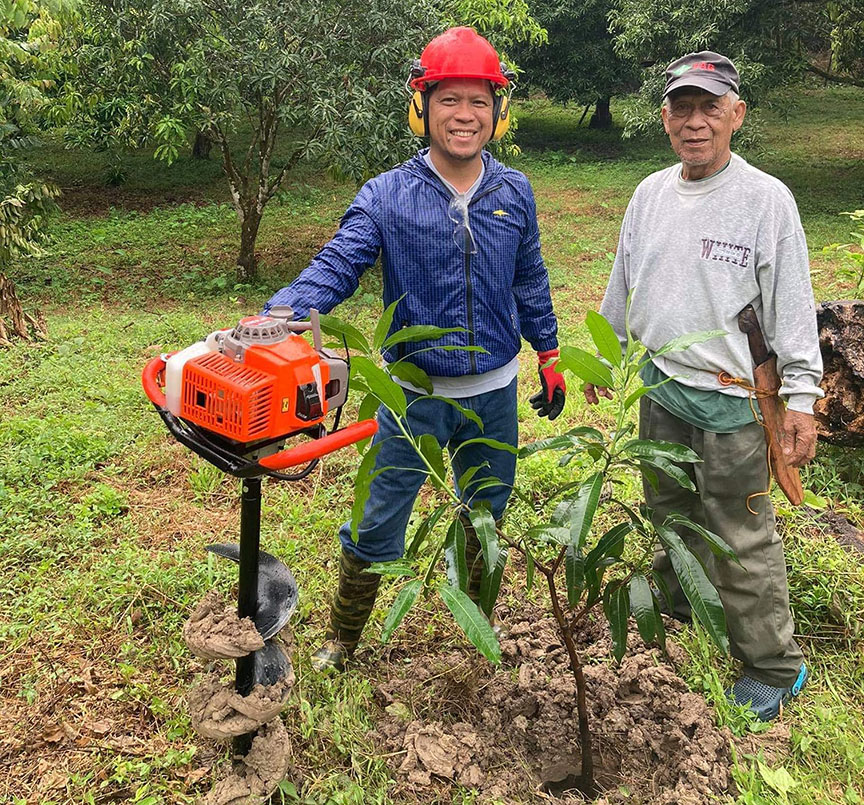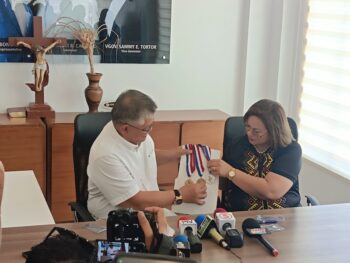FACES AND VOICES OF COVID-19
By Neil Ryan P. Pancho
 Neil and his father, Gualberto, at the farm. Photo courtesy of Neil Pancho
Neil and his father, Gualberto, at the farm. Photo courtesy of Neil Pancho
DAVAO CITY (MindaNews / 22 September) – Thursday of last week, I woke up with no smell. Suspecting that my sense of taste is gone, too. I took a pinch of salt. And tasted it. It was salty. My body was sluggish, luya ba. I still cooked the morning breakfast.
I sent an email to students that I cannot hold the class online. Itchy throat would interrupt my lecture.
I started to plot places and people I met two Sundays ago. Then, I called them one by one.
First on my list was the treasurer of our Dayong (mortuary association), I said, “Kumusta diha? Walay nasakit sa mga tawo nagtapok sa purok?” (How are you? Did anyone in the purok gathering get sick?) She replied, “Wala man. Uso man na diri mawad-an og panimaho” (None. Losing the sense of smell is common here). Haay! Who am I to argue?
Second, I called the secretary of our farmers’ association. I happened to meet her son while taking a break from pruning trees. She said, “Normal na gyud nang mawala ang panimaho. Ug magsakit ang lawas” (It is just normal to lose one’s smell. And feel your body aching). She went to the extent of describing their COVID-like symptoms. Deep inside, I said, “Patay na!” (The end!)
Third, and the last person I called was my father who lives in the compound of our old house. I described my symptoms. He said, “Ako pud. Pero okay na. Uso man na diri” (I feel the same way. But I’m okay now. That’s common here). I said, “Mao na ni!” (This is it!)
My farm is located in Barangay Bato, Toril, Davao City. The village is six kilometers from the población of Toril District. For me, this is not far considering the availability of habal-habal (motorcycle, sometimes with extended seats to accommodate more passengers) as means of transportation to get to the village.
As a teacher in social science, we know the meaning of words. They represent a context or describe a situation. There must be something when ordinary people say, “uso man na diri” (that’s common here) or “mawala ra man na” (that will go away).
COVID-19 is a medical concern. We don’t take it for granted. That is why I was alarmed when I heard these words. I was in the farm for more than a year. I never heard them before. Something is not right.
I hear people often say “walay COVID sa bukid” (there’s no COVID in the mountain). But my experience says otherwise. Because people treat it as something common, I wonder how many COVID-19 cases in the rural areas are not documented.
Over the weekend, I stayed in bed taking meds, temps, and vitamins. Temps ran from 36.7 to 37.1 degrees, oximeter from 96-99. No Linhua, no Ivermectin.
Last Monday, I decided for a confirmatory test. Tuesday, I got the news. The result: “SARS- COV-2 VIRAL RNA DETECTED.” I got COVID-19.
Symptoms are winding down. No more body pain, no itchy throat. I will wait for contract tracers to appear on my doorstep.
This is the good thing about vaccination. I had a complete dose last month. I evaded hospitalization.
(Neil Ryan P. Pancho teaches social science subjects like Philippine history and political parties and interest groups at Ateneo de Davao University.)
